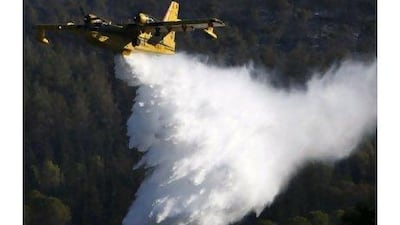TEL AVIV // Israel's worst-ever wildfire last week may have killed dozens of people and made hundreds of others homeless, but it also appears to be serving as the unlikely trigger for fence-mending talks with Turkey.
Following some two years of deep tensions, made worse following Israel's raid on a Turkish-flagged ship bound for Gaza last May, officials from the two countries met secretly in Geneva on Sunday to find a way to overcome the crisis in their formerly close ties.
The meeting, whose occurrence was confirmed to reporters by Turkish and Israeli foreign ministry officials who spoke on condition of anonymity, came just days after Turkey sent two aircraft to Israel to help battle a massive forest fire that killed at least 42 people.
Turkey's help, which arrived in parallel to assistance from other countries, prompted Benjamin Netanyahu, Israel's prime minister, to phone his Turkish counterpart, Tayyip Erdogan, and thank him. It was the first conversation between the two men since Israeli commandos killed nine Turkish activists while storming their boat, the Mavi Marmara, that was aiming to break Israel's blockade of the Gaza Strip and provide its residents with aid supplies.
Feridun Sinirlioglu, the undersecretary of Turkey's foreign ministry, held discussions with Joseph Ciechanover, an Israeli diplomat, on a possible agreement that would help repair relations, Israel's Haaretz newspaper reported yesterday.
The report said that a possible accord may call for Israel to apologise for carrying out the assault on the Turkish vessel and provide some sort of compensation. In return, Turkey will return its ambassador to Tel Aviv, whom it withdrew following the attack on the boat and other ships that were part of the Gaza-bound flotilla.
Haaretz said that Mr Netanyahu was the one to initiate the Geneva meeting, adding that it was at a "preliminary" stage in terms of repairing the two countries' relations and was expected to be followed by more such discussions in coming months.
However, it remains unlikely that Israel will succeed in quickly rekindling the former close commercial and military ties that it had enjoyed with Muslim, but secular, Turkey since the 1990s.
Mr Erdogan has been one of the loudest critics of Israel's policies towards the Palestinians, and especially of the three-week onslaught launched by Israel in Gaza in December 2008. Days after the assault ended, he stormed off the stage at a panel discussion on Gaza at the World Economic Forum in Switzerland after an angry exchange with the Israeli president, Shimon Peres.
On Sunday, Mr Erdogan suggested he will not easily agree to return to the old alliance, insisting that Turkey's help to fight Israel's deadly blaze should not be interpreted as more than a purely "humanitarian and Islamic duty."
"Now some are coming out and saying, 'Let's begin a new phase," Mr Erdogan said. "Before that, our demands must be met ... our nine brothers martyred on the Mavi Marmara must be accounted for. First an apology must be made and compensation must be paid."
Mr Netanyahu may also find some opposition from his hard-line governing coalition partners to offering Turkey an apology. Avigdor Lieberman, the ultranationalist Israeli foreign minister and the second-most powerful official in the coalition, in July said that Israel has "no intention to apologise."
The Haaretz report said that Mr Lieberman has been briefed on the Geneva meeting and that he has reservations about the reconciliation efforts.
Both Israel and Turkey stand to benefit from improved ties.
Mr Erdogan may be seeking a renewed closeness with Israel in a bid to boost his image among Western countries after disclosures by the whistleblower Web site WikiLeaks last week portrayed him as an Islamist and his government as corrupt.
For Mr Netanyahu, restoring the alliance with Turkey would be a public relations feat in the face of growing international condemnation of his right-wing government's policies towards the Palestinians, especially its push to expand Jewish settlements in the West Bank.
Turkey has also proven to be a strategic, diplomatic and commercial asset for Israel. It has been a significant buyer of Israeli arms, a key regional partner of military training exercises and a diplomatic bridge to Arab countries such as Syria, whose four rounds of indirect talks with Israel it had mediated in 2008.
Zvi Barel, a Haaretz correspondent, wrote in a commentary that it would be a mistake for Israel not to leap at the chance to restore its ties with Turkey.
"Turkey's strategic importance for Israel was not lessened by whatever grudges lingered after the flotilla incident," he wrote. "It is to be regretted that we needed a terrible catastrophe for a window of opportunity to open, but it would be a major diplomatic blunder if Israel squandered this chance."

